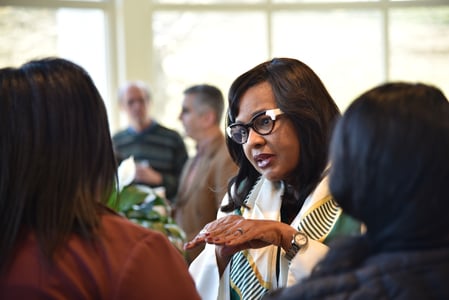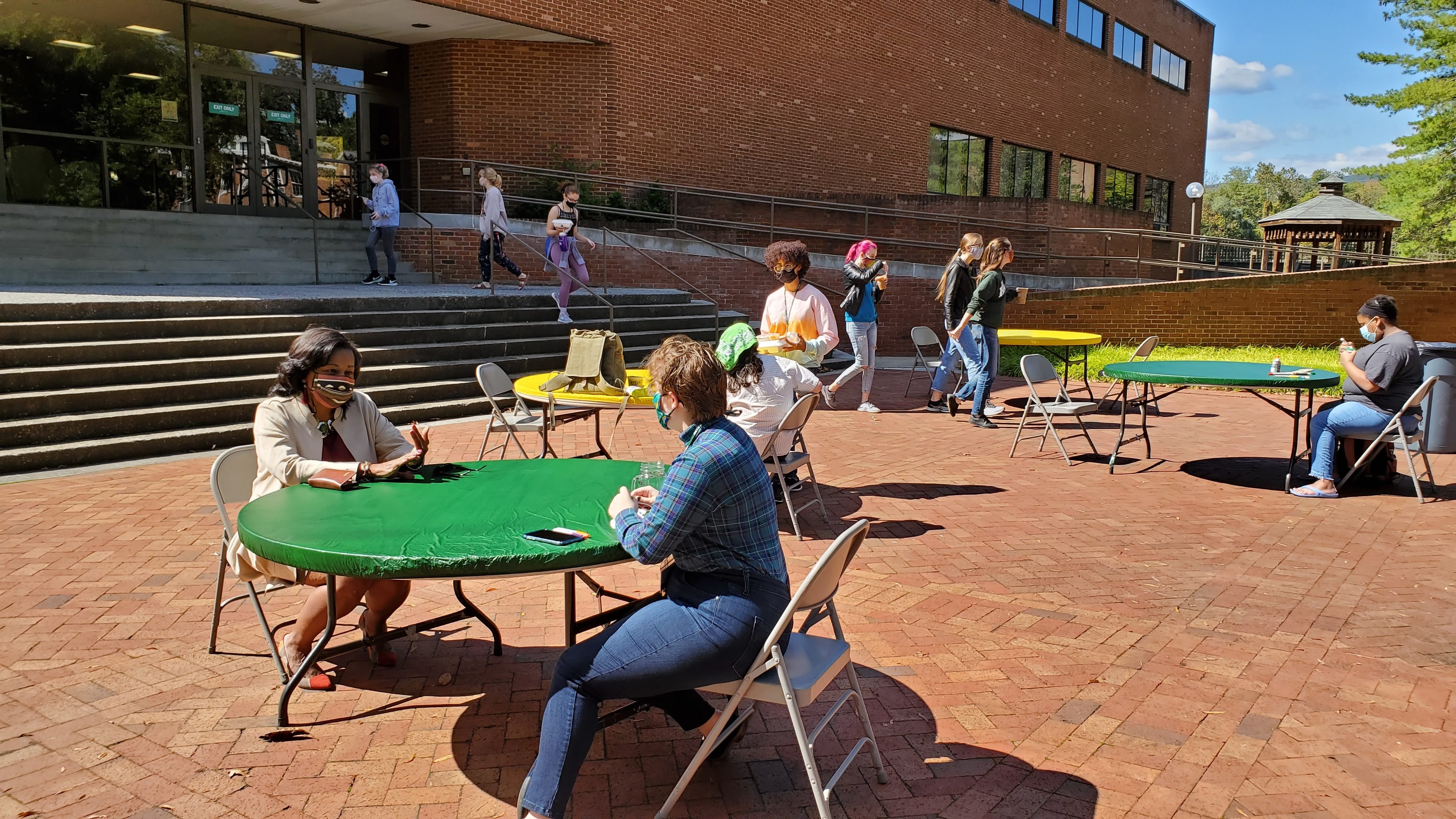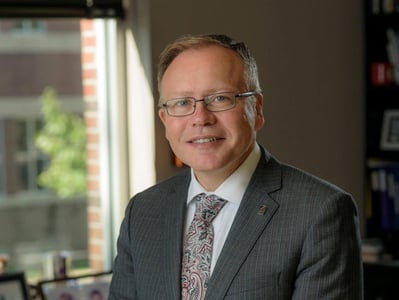
January 11 2021
February 2020, prior to the beginning of the pandemic, then-President-elect Hinton was officially introduced to the campus community.
On January 5, 2021, Dr. Mary Dana Hinton, President of Hollins University, graciously received the eighth annual Courageous Leadership Award to a Zoom audience of 60 elated, supportive, congratulatory friends and colleagues.
Dr. Hinton was introduced by the Reverend Dennis H. Holtschneider, CM., who Dr. Hinton described as the "the president I often find myself trying to emulate." In Dr. Hinton's address, she thanked her family, and shared the importance of "surrendering to your calling"
We invite you to share in the celebration of Dr. Mary Hinton by reading these timely, affirming remarks below. The Rev. Holtschneider's introduction of Dr. Hinton is directly below; Dr. Mary Hinton's Remarks on Courageous Leadership follow.
Introduction of Dr. Mary Hinton by the Rev. Holtschneider, CM
I want to thank Tom, Joretta and everyone who is Credo for this opportunity to talk about my friend. It’s a gift, and I’m very grateful. I also want to thank you for making the extraordinary details of Mary’s biography available online so that I can skip to the heart of it.
There’s an old story about the jazz pianist Art Tatum. Relaxing between sets in a 52nd Street bar in the 1940’s, Art Tatum sat alone at a table, drinking a beer from a bottle. A missionary wandered in from the street and came over to talk to him. She said, “joining the flock is your only salvation.” Without answering, Tatum took another swig of beer. “If you don’t join the flock, you’ll be a lost child of God,” she insisted. Art went on sipping his beer. When the musician decided that the evangelist had pestered him long enough, he shrugged and answered softly: “All God’s children are lost, but only a few can play the piano.”
I love that story for a lot of reasons, partly because I’m the son, nephew and cousin of three jazz piano players. But I especially love this story because Tatum didn’t let anyone tell him where God was and wasn’t.
I know from my own life that world will try to tell you who you should be. The decision comes in whether you let it. Resistance is all. And the Tatum story is definitely a resistance story. A polite one to be sure, but a “stand-your-ground” resistance story. History is made when people find and stay true to the highest convictions of their hearts.
I’ve been thinking of that as I read Barack Obama’s memoir this Christmas. There’s a leitmotif through it all of a man—a president—who knows who he is and decided over and over again to stay firm; to keep believing in the importance of public service and of our better natures, even when self-interest pushed back hard, relentlessly. Even when his own team suggested he take the quick compromise, or shorten his agenda.
I thought of Mary Hinton, too. I love Mary Hinton, for a lot of reasons. But there is one especially: She believes in what we do. And she doesn’t compromise, even when she proceeds with that calm voice and kind demeanor we all love.
There are college presidents who are “external presidents” and others who are “stay-at-home-and-run-the-store” presidents. Mary is both – at least when COVID isn’t clipping her wings. She’s out supporting all of us at one conference, or another meeting, at this board, or that association. Then she’s back on campus, meeting with students to mentor them. Or meeting with an employee without a college degree to mentor her. She transforms organizations. More amazingly, she creates cultures that see everyone and wonder how we can lift them.
Education isn’t just a job for any of us who are here tonight. But it’s a driving center and identity of every waking moment for Mary. She sees potential of those who get overlooked. She pushes them. Inspires them. Challenges them. And shapes organizations to serve them. Whether at St. Ben’s or now at Hollins, organizations quickly realize they are being led by someone who cares DEEPLY about the potential of these young people – or not-so-young people – and wonders what can be done MORE for them. BETTER for them.
 President Hinton (foreground, left) chats with students during an event this fall on the Moody Student Center Plaza.
President Hinton (foreground, left) chats with students during an event this fall on the Moody Student Center Plaza.
Someone once told me that the “cardinal sin” of academia is Pretention. Everyone trying so hard to be “all that” in front of everyone else, that they can’t find their way to the humility of needing to work together. Mary embodies that humility. She seeks advice at every turn. She wonders out loud about what needs to be done. She shares her challenges with roomfuls of young people, so that they don’t cave when they meet their own challenges. Like Obama’s memoir, she ruminates interiorly, knowing her weaknesses, but also knowing exactly why she does this with her life.
And for that reason, none of us have to be anyone else than who we are when we are with Mary Hinton. She keeps her heart on her sleeve and helps us do the same. Mary believes in the work we do. She believes in us, her colleagues. And she resists any compromise.
Just yesterday, in her session on race on campus, she said to us, “It’s our responsibility as presidents to sit in the uncomfortable place, engage matters of race, and come to some resolve. We are forced to reveal our hearts and to do the hard work with our communities.”
That’s Mary. She believes leaders have to go first. It’s gentle. It’s loving. And it’s uncompromising. Higher education is a mission for her. It’s how she does justice. Her heart for that sense of mission inspires me and I know many others. Like Tatum, she knows who she is.
Mary, all God’s children may be lost, but not everyone has the heart for leadership. Thanks for being our colleague, our friend, our inspiration. Thanks for reminding all of us why we got involved in this work in the first place. And thanks for your good and steady heart. It makes all the difference.
Dr. Mary Hinton's Remarks on Courageous Leadership
Good evening and thank you, everyone, for sharing this occasion with me. Father Dennis, words cannot express my gratitude for your warm and generous introduction. I have long admired you as a leader, and you are the president I often find myself trying to emulate: a leader with compassion, grace, faith, and an unwavering belief in the goodness of humankind. For you to share such kind words about me is a bit surreal. Thank you for being who and what you are and for all of your support over the past several years.
Thank you, also, to Credo, especially Joretta Nelson and Tom Gavic, for this extraordinary and completely unexpected honor. They, along with my colleagues Betsy and Sheyonn, can attest to my great surprise upon hearing that I was receiving this award. Thank you, Credo, for the near-decade that we have known one another and the many times and ways that you have encouraged me as a leader.
I must also thank my family. Team Hinton-Williams is my favorite cast of characters who cheer me on and make all manner of accommodations in order for me to do this job. Without Robert, Hallela, Hillel, and Hosanna, there would be no President Hinton. Thank you to all my fellow presidents who have journeyed with me. And, of course, there are several people in this Zoom room that I need to thank by name: Thank you to my Hollins board chair, Alexandra Trower, and Hollins board members Jenny Harrington, Sandra Kiely Kolb, to my executive assistant and board secretary Sheyonn Baker, and to my former COS at CSB, Kathryn Enke and former trustee Dan Scott. I am so grateful to each and every one of you.
Now, Joretta assures me that most recipients of this award have said they don’t see themselves as courageous. That helped me feel a bit more normal, but it still left me with some uncertainty about what to say in these remarks. This year, in particular, there were many moments when I did not feel so courageous as a leader. For example, telling students they couldn’t remain on campus over the winter break even though they were unsure where they could go felt wretched; or, stripping away the basketball team’s hopes for a season, and being the only leader in our athletic conference to do so, caused exquisite hurt; announcing an accelerated comprehensive planning initiative to our Hollins community when they were simply exhausted, were all moments when my heart twisted with a real and physical stirring. My dismay wasn’t with any of the decisions - the decisions were often clear - but my heart ached because I could either see the pain I was causing others or, I could hear the community’s fatigue and fears about the future of higher education. On Zoom, you can watch disappointment spread across faces and crystallize in peoples’ eyes. Eyes in which I feel compelled to look as a leader. Repeatedly this semester, I’ve been reminded that leadership isn’t about making the big decisions - that’s often uncomplicated. I have come to believe that leadership is about seeing the humanity of others as those decisions unfold. But, does that make one a leader?
"To be very honest, I have long pondered questions of what it means to be a leader. I grew up in a world that consistently told me that I’m not a leader; that I don’t look like a leader; and truthfully, only 5% of college presidents are women of color so there aren’t many leaders who look like me. How much of that narrative had I internalized? Enough that, in fact, I initially didn’t even aspire to a college presidency. I was a reluctant leader, a leader whose heart sometimes hurts.
To complicate matters, for the past several weeks, I have spent a great deal of time trying to discern what it means to be a courageous leader. To support my discernment, I decided to go back to the Latin origins of the words, courageous leader, to figure out what they mean. There are multiple Latin translations for leader, but since it’s already in my title, I decided to go with ductor, which connotes the leader and the guide. There are other translations, but I find myself clinging to the notion of a leader as a guide, as opposed to a chief or general or captain. A guide is one who is with the group, helping to fashion their journey and their path while also helping to shape the group’s experience. I actually delight in that notion leader as guide.
Of course, everyone here knows that the word courageous derives from the Latin word couer, or heart. However, as I grew up reading about leaders and what makes a good leader, I didn’t hear much about the heart. In fact, much of the leadership development theory to which I was exposed to seemed to go out of its way to say that you must be objective, cold, unemotional, impersonal to be a leader. That you must command respect. I didn’t grow up thinking of a leader, especially not a courageous leader, as someone who guides from the heart. But now as I think about what courageous leader means, I believe that one who guides from the heart might be a compelling definition.
Over the past seven years, I have learned that leadership in fact requires that you do certain things from the heart. Things which also, perhaps, require courage. So, to lead courageously is, to some degree, about the choice to lead with the heart. You see, to be a leader, I have learned that you have to have the courage - the heart - to listen to your team. I have repeatedly said that a leader is only as good as the people with whom they surround themselves. And, if you’re surrounded by good people - as I have had the uncanny privilege to be throughout my career—then you must actively seek out and listen to their counsel. For the people with whom you are closest, the people who are with you in the arena, the people who stand alongside you in good times and bad, you must have the courage to listen to them and for them. That does take some level of courage as there’s this mythology that the leader is on their own, but in my experience, I am a much, much better leader because of the people around me.
What this means, though, is that you have to have the courage—the heart—to be vulnerable with your team and with your community. You have to be human, real, fallible, with the people you have the privilege of guiding. That feels risky, just saying it out loud. But you cannot lead if you are living a divided life—a human in private while attempting to be a superhero in public.
You cannot effectively do this work compartmentalizing your truth from your role; your vulnerability from your courage. To me, vulnerability and courage are twins. In fact, I have come to believe that to be courageous without vulnerability risks being cruel. Your vulnerability—your humanity—is what allows you to make the difficult decisions and still garner the support of your community simply because they know you care. Because they know your heart. Because they know you, too, are impacted. But inherent in that premise is the notion that you know your community and they know you. As a leader, you have to have the courage—the heart—to be in relationship with the people you are guiding—all of the people on the journey. Just because someone is slower along the path or complaining about the way forward doesn’t mean you walk away from them. It’s at those moments when your relationship matters even more. You have to be a fellow sojourner. You have to be a partner, not just a leader.
I have learned these lessons and stand by them, thanks to the people in this room. I have become comfortable guiding with my heart—a heart that, I confess, often asks for data —but a heart that first tries to see the hopes, the fears, the calling in others and recognize that by helping them be their best selves, our entire community is better, stronger.
And yet, I still find myself uncomfortable with this recognition. I think it’s because while I believe and endeavor daily to live out all of the above, I know that my leadership comes not by my choice but by my calling. If I am courageous, it’s not because I choose to be. It’s because I have to be. When I think about my journey, there’s some degree to which I didn’t have a choice. I did not choose this work. I was called to it. Here’s what I mean by this.
To do some of the most fundamental parts of this work requires that I do things that no rational person would choose to do. All too often, I have to screw up my courage—activate my heart—to do the simplest things. For example, when I have to walk into a room - at a conference, a fundraiser, a dinner—and I am the only person of color. I experience both the extraordinary privilege and exquisite inequity in that moment. I know that my calling demands that I be in that room; that my work is there. But my presence signals not courage, but fulfilling my call, doing what I must even when that action brings forth private pain. You see, my heart still twists when I recall my very first CIC meeting when a few colleagues asked me, repeatedly, how I had managed to become a college president or when the restaurant refused to seat me while seating my colleagues.
No one would choose to be made to feel less than. Nor will I define myself by
those moments. But that I refused to be defeated wasn’t an act of courage. It was an act of defiance. It was—and is—my work to fulfill my calling, no matter the hurt, so the next generation doesn’t experience that same pain. Likewise, while some may call it courage, I call it merely trying to affirm my own and others’ humanity when I speak against injustice, fight for equity, persist in talking about inclusion, or justify the unique value of women’s education. This part of my work can be exhausting, a level of exhaustion no one would choose, but an exhaustion that must be embraced if it’s what you are called to do. I lead with my heart when I speak up and act, not because I am courageous but because I must.
So, if I have any courage, it was born of the necessity to just be myself in a world where that’s not always enough. If I am courageous, it is because my life has required this of me….in many instances, it has taken courage to simply stand up; to simply to exist. But once you have stood for yourself, you have to, and you feel equipped to, stand up for others. So, for me, being a courageous leader means having the courage—the heart—to surrender to your calling. To realize each day that there is work to be done and that you have to do it. With your heart.
Friends, I know that I am not alone in these experiences. To all in this room who have likewise struggled; who have felt dismissed; who have felt diminished, who have felt defeated, know that you are not alone. Recognize that your calling to the work is bigger than all the other things, including whatever forces may be working against you. Know that your calling guides your heart. And, by definition, that makes you a courageous leader.
I encourage each of you to think about how you can gently tend to the hearts of your community as you do your work each day. How you can look into your own heart and carefully hold your humanity because it’s with your heart—in its joys and its pain—that you lead courageously.
Thank you.
To learn more about Mary Hinton’s professional accomplishments, contributions to national higher education, and the breadth of her academic interests, please visit her official Hollins University biography.
To be considered for the Credo Courageous Leadership Award, a leader need not be a current or past Credo client.
All photographs are courtesy of Hollins University.
Related Blog Posts
Recent Posts
- Richard Dunsworth, J.D., To Receive 12th Annual Courageous Leadership Award December 16 2024
- Meet the 2024 Credo Values Award Recipients August 27 2024
- What is Executive Coaching, Really? June 25 2024
- Credo & The Constructive Dialogue Institute Announce A New Partnership For Higher Education Leadership Development March 7 2024
- Celebrating Women And Gender-Diverse Learners & Leaders February 28 2024
Categories
- Strategy
- Leadership
- Student Success
- Student Success & Retention
- Enrollment
- Pivot
- Strategic Planning
- Leadership Development
- News
- Strategic Enrollment
- Campus Planning and Architecture
- Moving the Needle
- Data
- Research
- Retention
- Campus Master Planning
- Enrollment & Financial Aid
- Academic Programming
- Campus Planning
- Thriving
- Admitted Student Research
- Architecture
- Finance
- Advising
- Admissions



